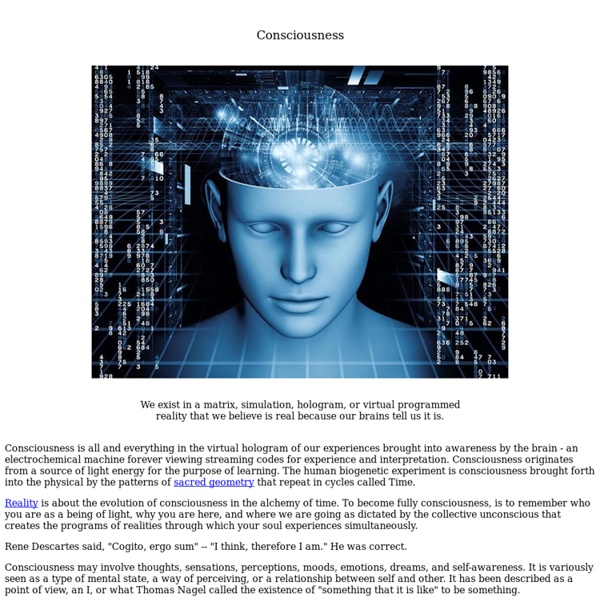Consciousness

What Is the Fundamental Nature of Consciousness? [Excerpt]
This chapter from PHI: A Voyage from the Brain to the Soul, by Giulio Tononi (Pantheon, 2012) describes Tononi’s theory of consciousness as a measure of information. The brain, Tononi postulates, consists of billions of neurons: think of them as if they were transistorlike bits that, when tallied, sum to equal more than their parts. That increment above and beyond—Tononi calls it phi—represents the degree to which any being, whether human or mule, remains conscious. From the forthcoming book PHI: A Voyage from the Brain to the Soul, by Giulio Tononi Copyright © 2012 by Giulio Tononi Published by arrangement with Pantheon Books, an imprint of The Knopf Doubleday Publishing Group, a division of Random House, Inc. Integrated Information: The Many and the One In which is shown that consciousness lives where information is integrated by a single entity above and beyond its parts When is an entity one entity? While musing such matters, Galileo was startled by a voice. An image came to Galileo.
The Stream of Consciousness
The Stream of Consciousness (1892) William James The first and foremost concrete fact which every one will affirm to belong to his inner experience is the fact that consciousness of some sort goes on. 'States of mind' succeed each other in him. ....How does it go on? 1) Every 'state' tends to be part of a personal consciousness. 2) Within each personal consciousness states are always changing. 3) Each personal consciousness is sensibly continuous. 4) It is interested in some parts of its object to the exclusion of others, and welcomes or rejects -- chooses from among them, in a word -- all the while. In considering these four points successively, we shall have to plunge in medias res as regards our nomenclature and use psychological terms which can only be adequately defined in later chapters of the book. [Personal Nature of Consciousness] When I say every 'state' or 'thought' is part of a personal consciousness, 'personal consciousness' is one of the terms in question. a. b. [Attention]
Consciousness
Representation of consciousness from the seventeenth century At one time consciousness was viewed with skepticism by many scientists, but in recent years it has become a significant topic of research in psychology, neuropsychology and neuroscience. The primary focus is on understanding what it means biologically and psychologically for information to be present in consciousness—that is, on determining the neural and psychological correlates of consciousness. The majority of experimental studies assess consciousness by asking human subjects for a verbal report of their experiences (e.g., "tell me if you notice anything when I do this"). Issues of interest include phenomena such as subliminal perception, blindsight, denial of impairment, and altered states of consciousness produced by drugs and alcohol, or spiritual or meditative techniques. Etymology and early history[edit] John Locke, British philosopher active in the 17th century In the dictionary[edit] Philosophy of mind[edit]
The Highly Sensitive Person
Related:
Related:



